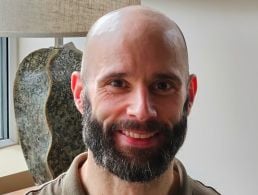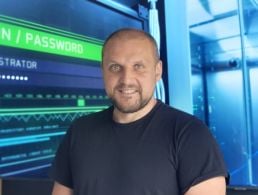Sufyan Huma began working for Intel at the end of last year. Here, he shares his experience of starting out and the skills he has learned so far.
Sufyan Huma is currently working at Intel as an integration engineer in the yield department. He is a graduate of NUI Galway with master’s in medical physics and a bachelor’s in nanotechnology from TU Dublin.
Huma joined Intel in November 2021. As a new employee, he said it was hard to get used to working remotely while familiarising himself with the tools and technology used at the company.
“Working remotely has made it difficult to have face-to-face interactions but I regard myself very fortunate to be part of such a diverse and accepting group where help is available when asked and is offered,” he said.
‘Working as an engineer is the most unpredictable profession’
– SUFYAN HUMA
If there is such a thing, can you describe a typical day in the job?
My day at work starts with what we call tactical pass-down via Microsoft Teams as currently I am remote. Normally, this would be in person. In pass-down, we discuss any issues that need to be communicated to senior management.
This is to ensure that we capture any issues in the last 24 hours in the factory and that we have plans and documents in place to deal with such events, if any occurred.
Then the day will include web-based trainings that I take at my own pace as well as learning on the job by sitting in meetings relevant to my role.
Regular breaks are crucial as remote working can be difficult, so it’s important to keep the energy levels high with micro-breaks. I use Wellnomics as a good indicator as to when I need a micro-pause or a short break.
The facilities available makes the workload bearable as there is plenty of time and resources given to deal with task at hand.
What types of engineering projects do you work on?
The type of projects I work with are new product introductions (NPIs), which includes the flow, quality and implantation of new products. I manage the process of improvement as well as the process at the factory. Since we are a yield department, our focus is always to focus on the yield output.
Other engineering projects I am involved with include working with modules to develop experiments and improve the yield of the processes. This is done in collaboration with module partners and we work on design and implantation of the new processes.
I am really enjoying the NPIs as we get to see all the new products being introduced and being implemented after they are approved. To be able to see them then in work really makes you feel like you are a part of something that is giving back to society with this ever-evolving technology.
What engineering skills do you use daily?
On a day-to-day basis, the skills that are utilised the most are data analysis and model-based problem-solving. But also, to intercept and interpret data to see real signal correlations versus false signal.
We use tools like statistical process control (SPC) and e-tests to scan through data coming out of the factory. Then after scanning through the data, we can see if something needs solving or leave it be.
I had never used SPC and e-tests before for data analysis so the idea is still new to me. But even data analysis as a skill, I had studied it but never get the opportunity to utilise it at such a large scale and for such a huge manufacturing facility. It feels like a rewarding work.
What are the hardest parts of engineering?
The hardest part has been working remotely due to Covid. As a new hire, it can be daunting to learn, understand and then utilise what you learn.
The fear of making a mistake is higher as it could be believed that you haven’t learned anything. Face-to-face interactions does help speed up the process of training and the learning curves.
Communication is certainly a big part of the challenge as I am more comfortable with face-to-face interactions. And the morale is certainly high around the office when in person.
To navigate these challenges, our departments have set up weekly meet-ups virtually so that the new hires don’t feel out of place. I believe it is a very generous thing to do for everyone to volunteer their time and interact.
Work-life balance has been rather easier as there is little to no commuting, so that time is spent with the loved ones and family. Overall, it has been nothing but a rewarding and unique learning experience.
Do you have any productivity tips that help you through the day?
There are a couple of productivity methods that I practise. But the crucial ones are enough sleep and having a journal to write down notes and lists of priorities.
But getting enough sleep and light exercise goes a long way, especially when working remotely. Light exercise could be as little as 10 minutes of a walk. It really does boost the immune system and stops you from falling into the laziness trap.
What skills and tools are you using to communicate daily with your colleagues?
The main tool of communication with my colleagues is Teams. This is where most of our day-to-day operations and communications happen. But aside from that, I’m an active user of LinkedIn and Instagram to communicate with my friends.
I use LinkedIn to connect and meet professional connections. I believe everyone in a professional setting should be somewhat active on LinkedIn as there are good resources that could be beneficial. You never know, you could be one message from your future employer.
How has this role changed as the engineering sector has grown and evolved?
Engineering has always been to make life easier for people. Over time, engineering has become very automated rather than mechanical. I believe it is headed towards software and hardware.
This role is heavily data driven as we draw our conclusions based on the real-time data from the factories. The use of software and scripting is more evident than ever.
This role has certainly shifted towards software as the semiconductor industry is evolving and the integration of software has become an important part of the process.
What do you enjoy most about working as an engineer?
Working as an engineer is the most unpredictable profession. The saying is literally true here that ‘every day is not the same’. The best part about being an engineer is the challenge of solving a problem and bringing novel ideas and innovations to reality.
The thing I enjoy the most as an engineer is that I get to use my creativity every day. And the assurance that yes, the work I did today has made an impact.
What advice would you give to someone who wants to work in engineering?
The best advice is to ask yourself whether you like solving problems and if you have the technical ability to help and grow an organisation through your ideas and your technical skills. Then engineering might be your forte. Engineering is a very broad field and it certainly does open a lot of doors for one’s career.
The field is often at the leading edge of innovation and plays a significant role in shaping society and its future. By becoming engineers, people demonstrate that they have the broader interests of society in mind, including safeguarding life, health, property, economic interests, public welfare and the environment.
Some things to really pay attention to when considering engineering are that there might be challenges and also that engineering requires creativity.
You get to work with passionate people. You can make your mark on the world and you’ll never be bored.
Don’t miss out on the knowledge you need to succeed. Sign up for the Daily Brief, Silicon Republic’s digest of need-to-know sci-tech news.




